Solar Installers Highland Park
Top Solar Installers in Highland Park
Get 3 FREE Solar Contractor quotes for your project today! Compare profiles, reviews, accreditations, portfolio, etc... and choose the best offer.

Iconic Energy
4.663 reviewsRockford, IL, USA, 4617 American Road, 61109, USIconic Energy is a Midwest solar installation company based in Rockford, Illinois. Our main focus is to provide clean affordable electricity to homes and businesses in the Midwest.
- Services
- Why Us?
- Accreditations
- Our Team
- Testimonials
- Gallery
Get Quote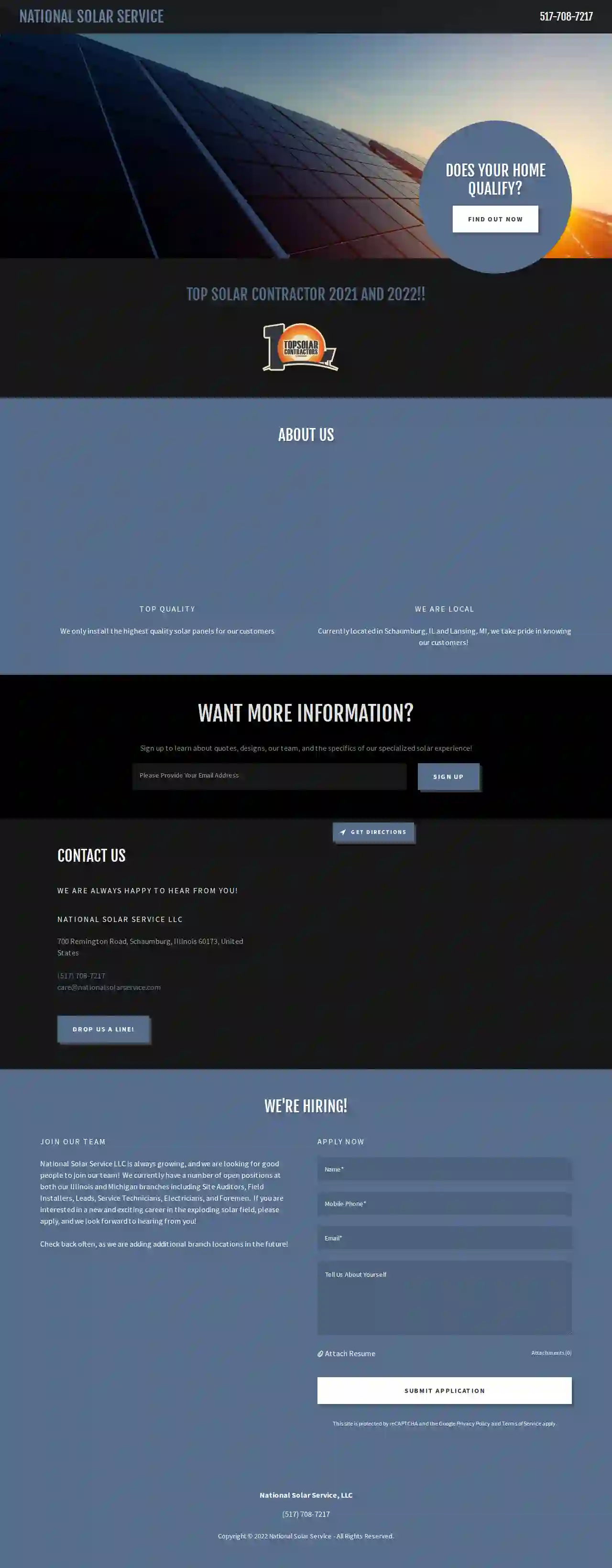
National Solar Service
2.223 reviewsSchaumburg, Illinois, United States, 700 Remington Road, 60173, USNational Solar Service LLC is a top solar contractor located in Schaumburg, Illinois, and Lansing, Michigan. They specialize in installing high-quality solar panels and offer a variety of services to their customers. Their team is dedicated to providing excellent customer service and ensuring that their clients' homes qualify for solar installation. They are proud to be a local business and take pride in knowing their customers. National Solar Service LLC is always growing and looking for good people to join their team.
- Services
- Why Us?
- Accreditations
- Our Team
- Gallery
Get Quote
Simply Solar Illinois
4.816 reviewsSimply Solar Illinois, Bethalto, Illinois, 123 Solar Lane, 62010, USSimply Solar Illinois specializes in providing customized solar solutions for residential, commercial, and agricultural properties. Our team works closely with clients to understand their energy requirements and design a solar system that maximizes energy savings. We handle everything from initial assessment and design to installation and ongoing maintenance. By switching to solar energy, clients can significantly reduce their operating costs, enhance their sustainability efforts, and take advantage of various tax incentives and rebates.
- Services
- Why Us?
- Accreditations
- Our Team
- Testimonials
- Gallery
Get Quote
SunStyle
8140 McCormick Blvd. #141, Skokie, IL 60076, 60076, USSunStyle is a Building-Integrated Photovoltaic roof / BIPV. Installed with a single set of building materials, the structural roof and energy generating modules are one. SunStyle is a structural roof and solar module combined, providing a durable, leak-proof roofing solution that is both beautiful and protective.
- Services
- Why Us?
- Accreditations
- Our Team
- Testimonials
- Gallery
Get Quote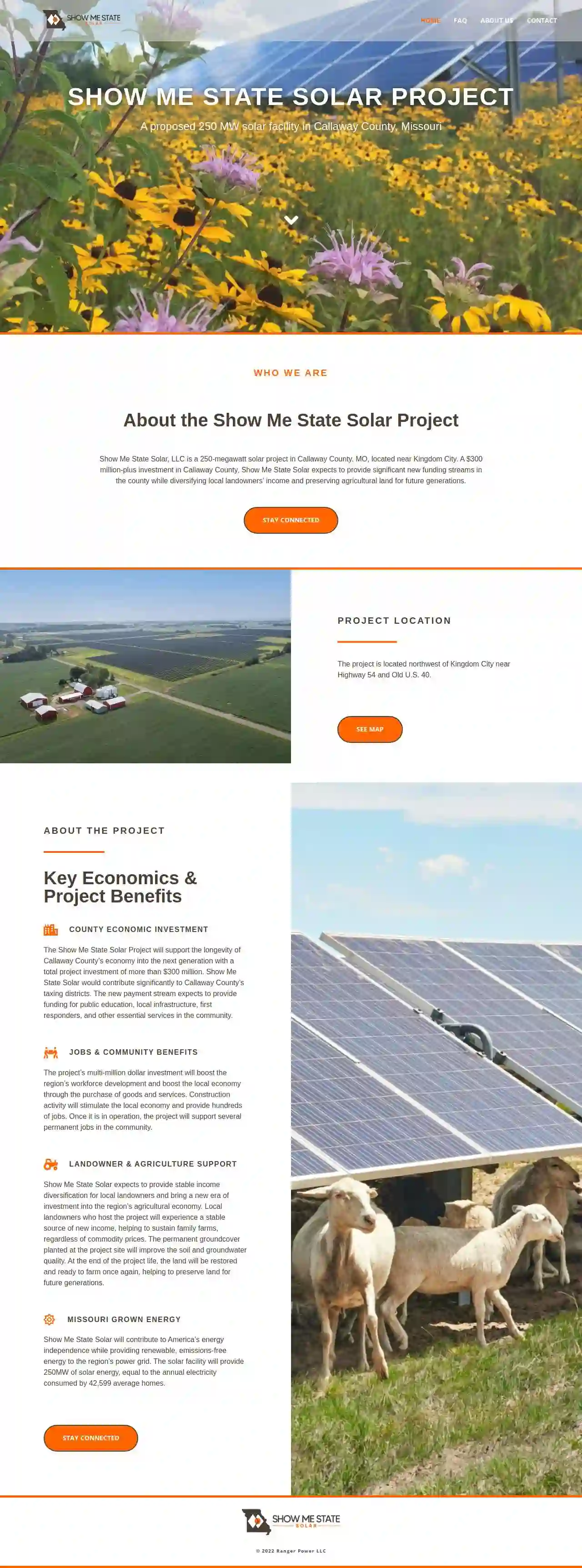
Ranger Power Show Me State Solar Project
Highway 54, Old U.S. 40, Kingdom City, 65262, USShow Me State Solar, LLC is a 250-megawatt solar project in Callaway County, MO, located near Kingdom City. A $300 million-plus investment in Callaway County, Show Me State Solar expects to provide significant new funding streams in the county while diversifying local landowners’ income and preserving agricultural land for future generations.
- Services
- Why Us?
- Accreditations
- Our Team
- Gallery
Get Quote
Illinois Solar Services
Washington, IL, USA, 123 Solar Street, 62090, USIllinois Solar Services is a locally owned and operated company established to help residents, businesses, farmers, and municipalities become energy independent and save money long term. With inflation lessening supply by shutting down energy plants — along with increased demand for energy — utility charges are continuing to rise. The answer is simple: Use state-of-the-art equipment available to access the sun and supply your own energy. Take control of your utility expenses with the best technology, financing, and warranty.
- Services
- Why Us?
- Accreditations
- Our Team
- Testimonials
- Gallery
Get Quote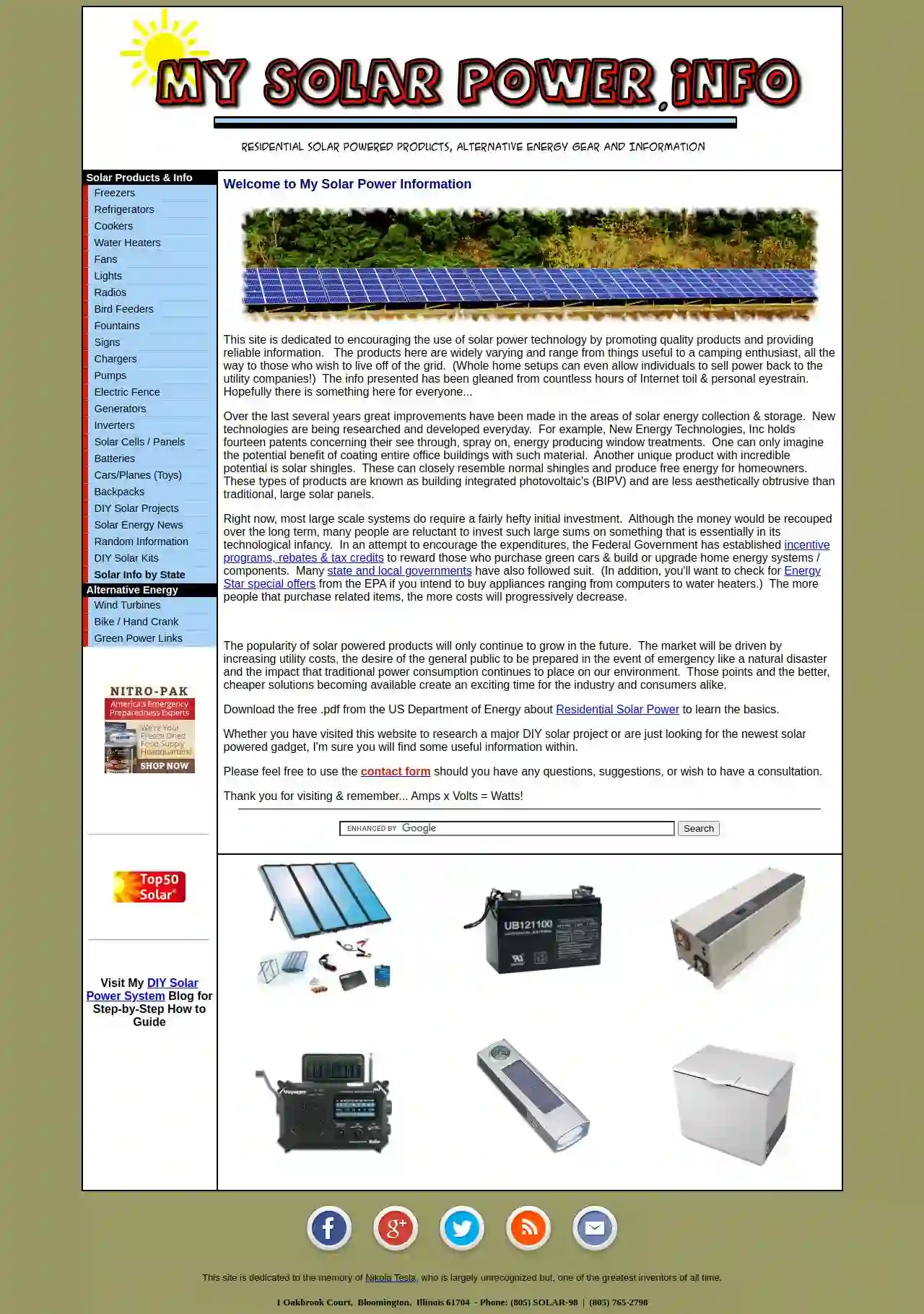
My Solar Power Information
123 Solar Street, Suite 100, Solar City, 12345, USWelcome to My Solar Power Information. This site is dedicated to encouraging the use of solar power technology by promoting quality products and providing reliable information. The products here are widely varying and range from things useful to a camping enthusiast, all the way to those who wish to live off of the grid. (Whole home setups can even allow individuals to sell power back to the utility companies!) The info presented has been gleaned from countless hours of Internet toil & personal eyestrain. Hopefully there is something here for everyone... Over the last several years great improvements have been made in the areas of solar energy collection & storage. New technologies are being researched and developed everyday. For example, New Energy Technologies, Inc holds fourteen patents concerning their see through, spray on, energy producing window treatments. One can only imagine the potential benefit of coating entire office buildings with such material. Another unique product with incredible potential is solar shingles. These can closely resemble normal shingles and produce free energy for homeowners. These types of products are known as building integrated photovoltaic's (BIPV) and are less aesthetically obtrusive than traditional, large solar panels. Right now, most large scale systems do require a fairly hefty initial investment. Although the money would be recouped over the long term, many people are reluctant to invest such large sums on something that is essentially in its technological infancy. In an attempt to encourage the expenditures, the Federal Government has established incentive programs, rebates & tax credits to reward those who purchase green cars & build or upgrade home energy systems / components. Many state and local governments have also followed suit. (In addition, you'll want to check for Energy Star special offers from the EPA if you intend to buy appliances ranging from computers to water heaters.) The more people that purchase related items, the more costs will progressively decrease. The popularity of solar powered products will only continue to grow in the future. The market will be driven by increasing utilization of the sun's abundant and free resource.
- Services
- Why Us?
- Accreditations
- Our Team
- Testimonials
- Gallery
Get Quote
Illinois Solar
57 reviewsAddress Line 1, Address Line 2, 2504 Chatten Drive, Quincy, 62305-8705, USIllinois Solar specializes in seamless solar solutions for your home or business. From design and architecture to installation and testing, we handle it all. Our top-notch turnkey services guarantee the highest quality from start to finish.
- Services
- Why Us?
- Accreditations
- Our Team
- Testimonials
- Gallery
Get Quote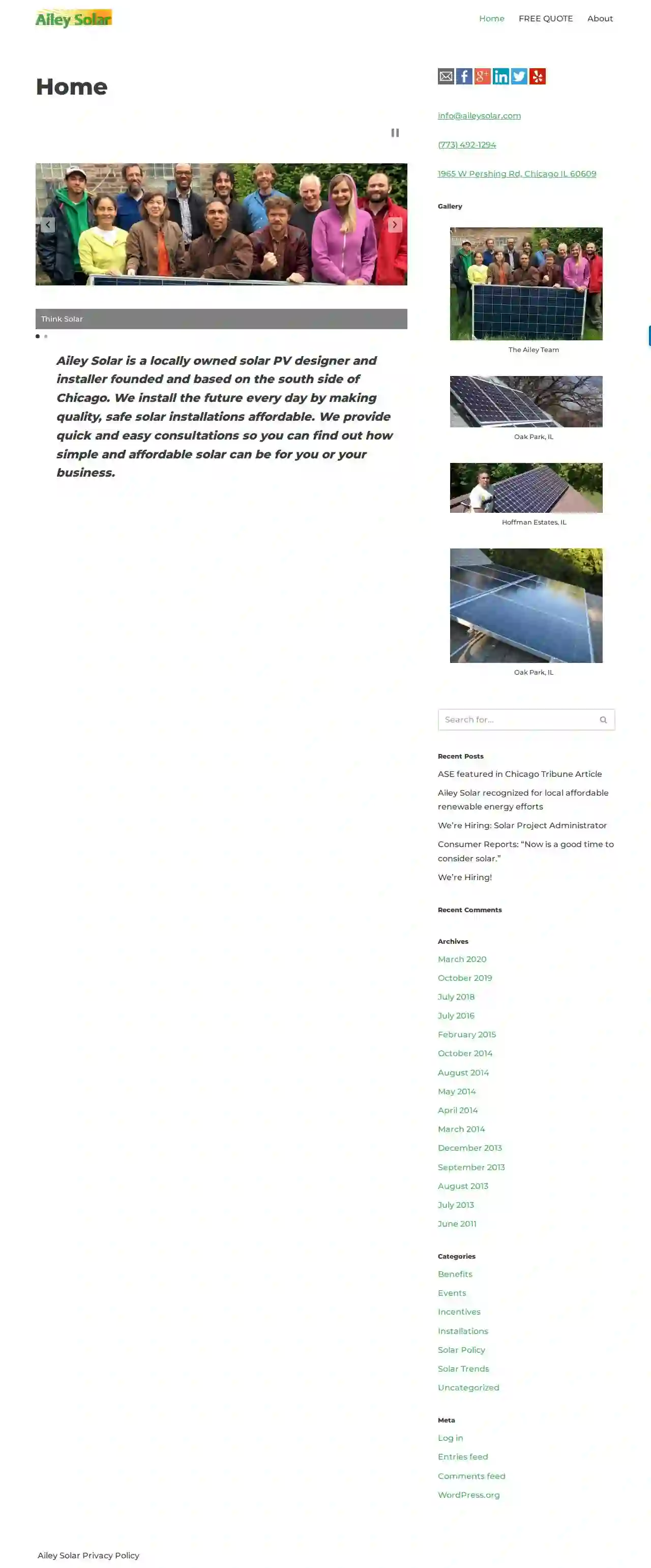
Ailey Solar Electric, Inc.
4.738 reviewsSuite 100, Chicago, IL, 123 Solar Street, 60601, USAiley Solar is a locally owned and operated business that has been providing solar solutions to Chicagoland residents and businesses for over 17 years. They offer a range of services including residential, commercial, and non-profit solar installations. Ailey Solar is committed to powering homes and businesses sustainably and has a team of experts who handle every step of the solar journey in-house, ensuring seamless quality and customer satisfaction.
- Services
- Why Us?
- Accreditations
- Our Team
- Testimonials
- Gallery
Get Quote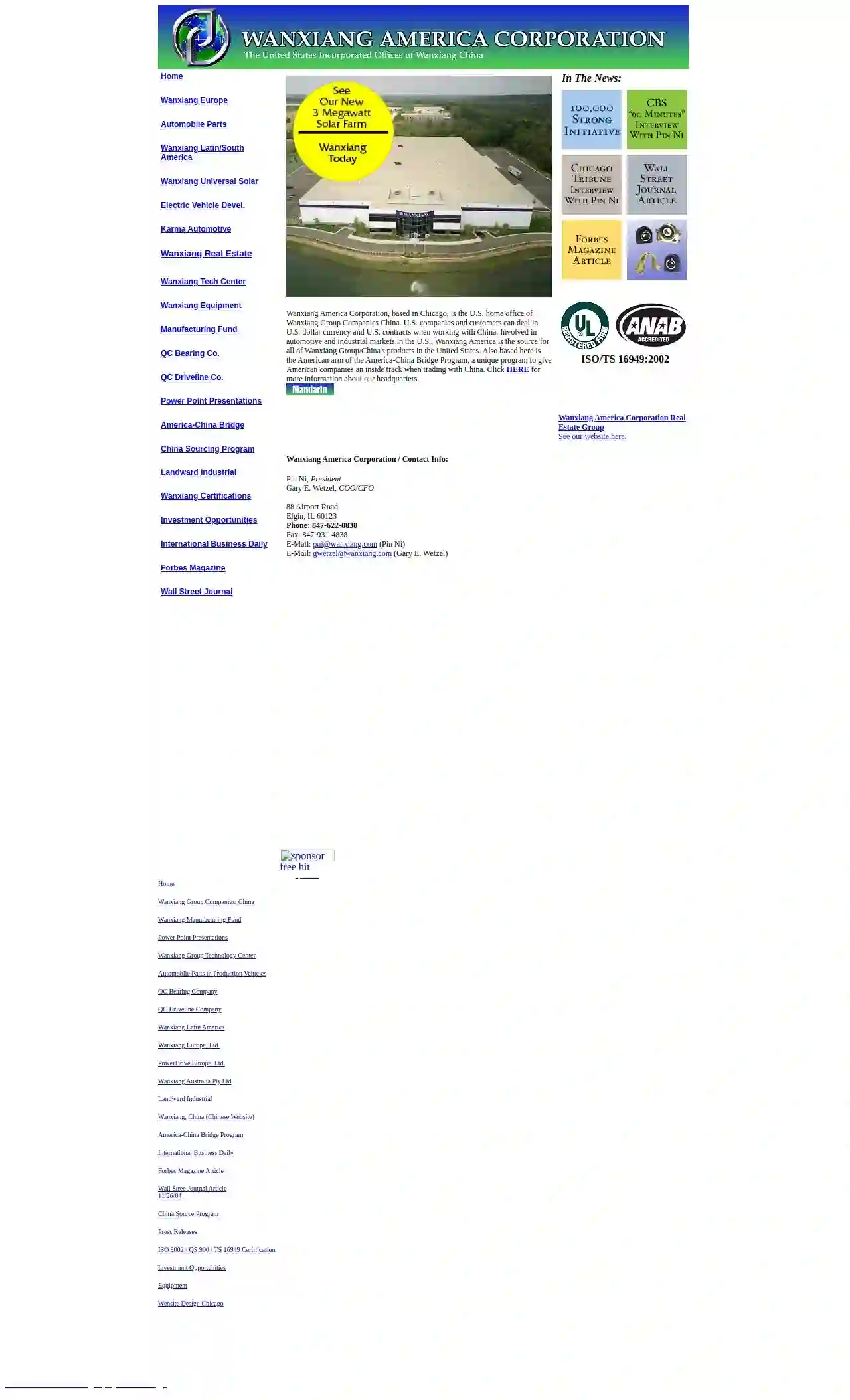
Wanxiang New Energy
52 reviewsWanxiang America Corporation, Elgin, IL, 88 Airport Road, 60123, USWanxiang America Corporation, based in Chicago, is the U.S. home office of Wanxiang Group Companies China. U.S. companies and customers can deal in U.S. dollar currency and U.S. contracts when working with China. Involved in automotive and industrial markets in the U.S., Wanxiang America is the source for all of Wanxiang Group/China's products in the United States. Also based here is the American arm of the America-China Bridge Program, a unique program to give American companies an inside track when trading with China.
- Services
- Why Us?
- Accreditations
- Our Team
- Testimonials
- Gallery
Get Quote
Over 4,210+ Solar Installers onboarded
Our solar contractors operate in Highland Park & surroundings!
SolarCompaniesHub has curated and vetted Top Solar Installers arround Highland Park. Find a top & reliable pro today.
Frequently Asked Questions About Solar Installers
- Cash Purchase: The most straightforward option, providing the greatest long-term savings but requiring a larger upfront investment.
- Solar Loans: Loans specifically designed for solar installations, often with favorable terms and interest rates.
- Solar Leases: A third-party company owns the system and leases it to you, allowing you to go solar with little or no upfront cost, but you won't own the system or receive tax benefits.
- Power Purchase Agreements (PPAs): Similar to leases, but you pay for the electricity generated by the system, not the system itself.
- Home Equity Loans or Lines of Credit: Borrow against the equity in your home.
- Analyze your energy bills
- Assess your roof's suitability
- Calculate your potential solar energy generation
- Recommend a system size that meets your needs and goals.
How can I finance my solar panel installation?
Will solar panels work during cloudy days or at night?
What happens to my solar panels during a power outage?
How do I choose the right solar panel system size for my needs?
How can I finance my solar panel installation?
- Cash Purchase: The most straightforward option, providing the greatest long-term savings but requiring a larger upfront investment.
- Solar Loans: Loans specifically designed for solar installations, often with favorable terms and interest rates.
- Solar Leases: A third-party company owns the system and leases it to you, allowing you to go solar with little or no upfront cost, but you won't own the system or receive tax benefits.
- Power Purchase Agreements (PPAs): Similar to leases, but you pay for the electricity generated by the system, not the system itself.
- Home Equity Loans or Lines of Credit: Borrow against the equity in your home.
Will solar panels work during cloudy days or at night?
What happens to my solar panels during a power outage?
How do I choose the right solar panel system size for my needs?
- Analyze your energy bills
- Assess your roof's suitability
- Calculate your potential solar energy generation
- Recommend a system size that meets your needs and goals.